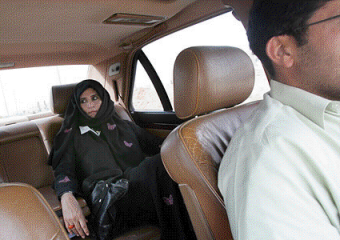Human Rights Voices
While the UN devotes its human rights operations to the demonization of the democratic state of Israel above all others and condemns the United States more often than the vast majority of non-democracies around the world, the voices of real victims around the world must be heard.
Saudi Arabia, September 27, 2007
From back seat, Saudi women long to drive
Original source
"...From a taboo about which there could be no open discussion, a woman's right to drive is developing into a topic of growing and lively debate in Saudi Arabia.
Coming on top of other recent changes - women may now travel abroad without male accompaniment (although they still require male permission), earn graduate degrees in law and engineering, seek divorce and own their own companies - the driving discussion is noteworthy. Whether it signals that women will actually be driving soon, or merely talking about it openly, remains to be seen.
"We are telling everyone this is coming, whether today or tomorrow," said Abdallah Samhan, producer, writer and host of "Tash Ma Tash," a variety comedy show that is broadcast during the holy month of Ramadan and that regularly tackles controversial social issues in Saudi Arabia.
...There is more. Saudi newspapers have begun writing about the implications and acceptability of women driving. The Saudi Human Rights Council, a government-backed advocacy organization, has started researching the effects of women driving on families and Saudi society.
Most recently, a group of Saudi women have led an ambitious petition drive asking the king to repeal the ban on women driving, placing the issue at the heart of a discussion about modernity and Saudi Arabia's place in the world. Unlike the last such petition, in 1990, the government seems mildly receptive rather than hostile.
"You get the feeling that they are preparing the population for this issue," said Wajeha al Huwaider, 45, one of the organizers. "It is just like the decision to allow women education. They resisted it, but now it's a reality." On Sunday, Huwaider and about 1,100 other women sent the petition to King Abdullah, demanding that women be given the right to drive, citing the lack of a religious reasoning against it.
Some Saudi officials and religious men agree with the women that Islam does not forbid women from driving. In the past, Saudi women were able to move freely on camel and horseback and Bedouin women in the desert openly drive pickup trucks far from the public eye.
Two years ago, Muhammad al Zulfa, a member of the Shura Council, which advises the king and cabinet, caused an uproar when he suggested that the council consider allowing women to drive.
But clerics and religious conservatives maintain that allowing women to drive would open Saudi society to untold corruption. Women, alone in a car, they say, would be more open to abuse, go wayward, and get into trouble if they had car accidents or were stopped by the police. The net result would be an erosion of social mores.
"Our parents had the right of movement; our grandparents had it, too," Huwaider said, speaking by telephone from Dammam. "But we ladies of the cities lost the old ways and got nothing in their place."
In 1990, a group of prominent Saudi women seized on the presence of Western media covering the first Gulf war, boarded cars and drove through Riyadh. Several of them were jailed briefly, many lost their jobs, and others were forced to leave the country for a time.
This time, however, the women are being given wide latitude to make their case, Huwaider said. She said she thought the case was being made in pragmatic social and economic terms, not purely as a matter of women's rights.
Due to the rising cost of living in Saudi Arabia, women have been entering the work force in droves. That in turn has given them newfound economic clout in the family and provided them with greater leverage.
"I really believe most people support women driving because they now realize that it affects the economy," said Ebtihal Mubarak, another organizer of the petition drive. Mubarak, an editor at the English-language paper Arab News, said the cost of a driver was getting too expensive for many families.
"Most middle-class people can't afford drivers anymore," she said. "A woman who gets a salary of 2,000 riyals now finds herself having to give 1,000 to the driver to get her back and forth."
The driving debate, many hope, may also open the door a crack to discussion of other restrictive practices regarding women in the kingdom, like dining in segregated sections in restaurants and working in segregated sections in offices. Women are also paid less than men.
Saudi women say that the push for change is due in part to the fact that they can now see and read about the freedoms of women abroad on satellite television and the Internet.
They also feel they have become more sophisticated in dealing with the Saudi system.
"Those women in 1990 were taking advantage of the politics at the time, but this is more organized and is a real campaign," said Khaled Dakhil, professor of political science at King Saud University in Riyadh. "They have been on the Net, sending out e-mails. Those who are running the show are the women themselves." Huwaider, one of the petition organizers, said, "As long as this issue is opened, big things will follow."
"It means you have allowed half the population of the country to move around as they please," Huwaider said. "And the conservatives know that will change society dramatically, which is why they are so opposed to it."
Still, few observers expect change soon. Huwaider said her group had received no reply to its petition..."

